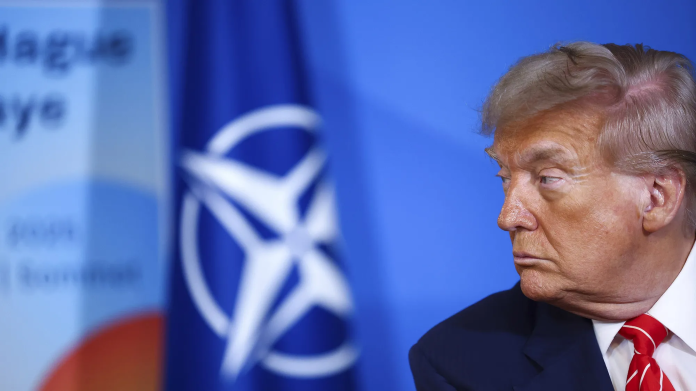US President Donald Trump announced a significant shift in US policy towards arming Ukraine, confirming the resumption of critical weapons shipments through a NATO-mediated financing arrangement that places the full burden of costs on European allies.
The move follows a turbulent week that saw unexplained Pentagon pauses to deliveries and escalating Russian aerial assaults on Ukrainian military infrastructure.
The United States military recommenced deliveries of 155mm artillery shells and mobile rocket artillery missiles (GMLRS) to Ukraine, days after the Pentagon unexpectedly halted shipments of vital munitions. Two senior US officials confirmed the renewed flow of these key battlefield assets, though exact quantities remain undisclosed.
This development comes amid Russia’s record overnight deployment of 728 drones against Ukrainian targets, underlining Kyiv’s desperate need for enhanced air defences. The paused shipment had included: 30 Patriot missiles, 8,500 155mm artillery shells, over 250 precision GMLRS missiles, and 142 Hellfire air-to-surface missiles.
Pentagon chief spokesman Sean Parnell acknowledged the suspension last week but offered no rationale, merely stating that “the president and the secretary will make those decisions about what happens.” President Trump later distanced himself from the decision, telling reporters:
I don’t know. Why don’t you tell me?
In a Thursday phone interview with NBC News, President Trump revealed a novel arrangement whereby NATO would bear complete financial responsibility for US weapons destined for Ukraine.
We’re sending weapons to NATO, and NATO is paying for those weapons, a hundred per cent. We’re going to be sending Patriots to NATO, and then NATO will distribute that.
The mechanism appears designed to address Trump’s repeated complaints about the cost of military support, particularly concerning the $4 million Patriot missiles he described as “very rare indeed” and “very expensive” during earlier remarks.
Concurrently, the Trump administration prepares to invoke the Presidential Drawdown Authority (PDA) for the first time in this presidency, an emergency power allowing rapid transfer of US stockpiled weapons. Sources indicate this package, potentially worth $300 million, may include Patriot missiles and offensive medium-range rockets.
Political backlash in Europe intensifies
The NATO funding mechanism and broader Western support for Ukraine ignited fierce criticism from French national-oriented politicians. Nicolas Dupont-Aignan, leader of the Debout la France party and former prime ministerial pick for Marine Le Pen, launched a scathing attack on social media platform X:
The EU wants to squander 100 billion through a shared fund with the UK and Canada to finance the purchase of weapons for Ukraine. Meanwhile, the state is bankrupt and wants to impose unprecedented austerity on the French. Let’s not give another cent to the EU and NATO, which are dragging us toward a third world war!
Dupont-Aignan’s stance aligns with his longstanding platform advocating French withdrawal from NATO’s integrated command and transformation of the EU into a “Community of European States”. His comments reflect deepening political fractures within Europe as governments balance military spending against domestic austerity pressures.
The French government responded to these tensions by advocating greater European military independence. Benjamin Haddad, France’s Minister for European Affairs, told Euronews that Europe must prioritise continental arms manufacturers to achieve true sovereignty:
Look at the debates we had over the long-range missiles sent to Ukraine. If you have American components and Americans decide they can’t do deep strikes to be able to defend themselves against Russian targets, they can control the use, even though the European countries who donated the arms have agreed to it.
This position gains urgency as the EU faces new fiscal rules imposing deficit limits alongside rising defence expenditures.
Mounting strategic pressures
Meanwhile, Secretary of State Marco Rubio disclosed that Washington is “actively” discussing Patriot battery sharing arrangements with European nations, suggesting countries defer their own deliveries to prioritise Ukraine’s needs.
There are other Patriot batteries and there are other opportunities. Countries that have ordered Patriot batteries that are about to receive shipments of them, it’d be great if one of them volunteered to defer that shipment and send it to Ukraine instead.
This diplomatic push coincides with Trump’s announcement of a forthcoming “major statement on Russia” scheduled for Monday, about which he offered no details beyond expressing disappointment with Moscow.
The developments unfold against a backdrop of escalating strikes, with Ukrainian President Volodymyr Zelensky urgently appealing for enhanced air defences following Russia’s unprecedented drone offensive.
As Defence Secretary Pete Hegseth reportedly finalises the PDA package contents, the NATO-funded model represents both a stopgap solution to immediate Ukrainian needs and a signal of deeper structural shifts in transatlantic burden-sharing.
